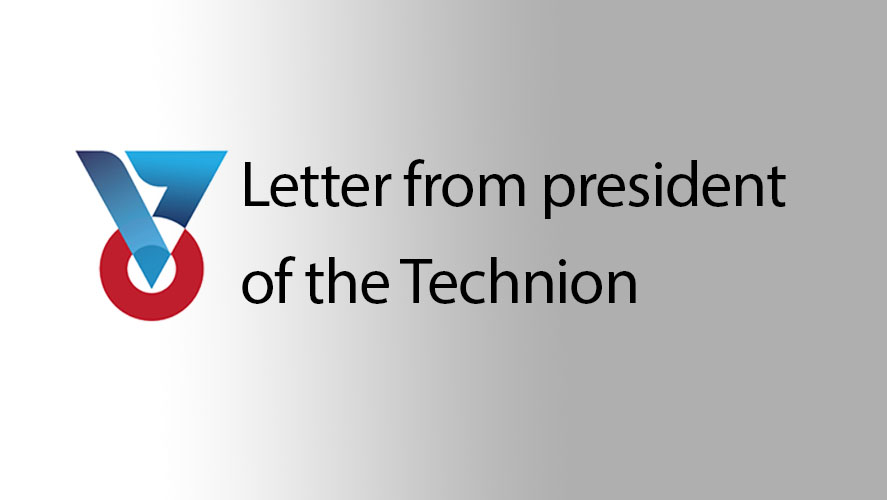
For the first time in over a century, we are faced with a pandemic of unpredictable proportions.
Article published by the president of the Technion April 07, 2020.

A tiny, invisible virus took humanity by surprise, affecting the lives of all of us, causing uncertainty and worry for the wellbeing of our families and friends. Such times remind us of the true value of friendship and solidarity within our closer and wider circles of life. They also underscore the power of science and technology, be it medical care or the information technology that keeps us connected while maintaining social distancing.
The situation in Israel is more or less under control. The rate of infection is still high, but we have started seeing a minute positive effect of the broad lockout. The next days will tell how well we are containing the plague. On March 17th, one day before the opening of the spring semester, the Technion was officially shut down in accordance with government regulations. After taking all necessary steps to secure the health of our staff and students, Technion swiftly moved online. I am proud to report that the semester began on March 18th, on schedule, with a comprehensive program for distance teaching for all our students. All lectures and tutorials are being taught as scheduled, barring lab classes, which are on hold temporarily. Our first online survey reported an overwhelming 97.5% satisfaction by students and faculty alike, which is a credit to the unprecedented mobilization of our devoted staff, faculty members and the Students Association, who worked tirelessly to get the online semester up and running. This achievement also highlights the solidarity, agility, and improvisation skills that many times present themselves in Israel in a time of crisis.
COVID-19 presents a global challenge, which ultimately requires global scientific and technological solutions. The combination of science, engineering and a medical school quickly put Technion at the forefront of this fight. The close cooperation between Technion, hospitals and industry constitutes a unique resource for facilitating speedy healthcare solutions for the benefit of humanity. Within three weeks, Technion researchers in nearly 30 labs, and growing fast, have begun working round the clock to fight the spread of COVID-19 through targeted emergency research projects, while collaborating closely with the health system in order to find immediate solutions. The projects are diverse, including advanced diagnostic techniques, personalized medical treatment, targeted drug delivery, treatment protocols based on machine learning and AI, big data management, and robots for remote medical care. In addition, Technion and Rambam Health Care Campus are collaborating closely on a number of emergency projects that are critical to minimizing the exposure and infection of the hospital’s staff by the corona patients.
The current crisis is also imposing a financial strain on Technion students and employees. Government regulations limited employment to 30% of the workforce, and recently reduced this number to 15%, sending thousands of students and employees to seek support from Social Security. To help our students, Technion, in collaboration with the American Technion Society, has set up an emergency student fund. Simultaneously, to support our employees, the senior academic staff has voluntarily waived part of their salary in the next few months towards the establishment of a solidarity fund. It is heartwarming to witness how united the Technion family is—students, employees, faculty, and supporters.
As difficult as things are, the lessons learned during the present crisis also offer new opportunities. Under the circumstances, we had to switch in one week from traditional teaching in classrooms to fully-fledged online teaching, a feat that would have taken months under normal conditions. This is not to say that online teaching will substitute personal encounters; on the contrary—the limitations of the former have also become evident during this forced large-scale experiment. However, a new hybrid of frontal and online teaching will probably emerge, offering remarkable opportunities for globalization, joint programs with universities abroad, and much more.
The same is true for research. The number of local and international collaborations with academia, industry, research institutes, and hospitals has grown exponentially, confirming the value of partnership and demonstrating that much of the communication can, in fact, be carried out online. Paradoxically, the social distancing imposed on us confirmed the importance of collaboration and the fact that geography no longer presents a barrier. The world has become even flatter, in Thomas Friedman’s words.
Dear friends across the world, our minds and hearts are with you, wherever you are. Next week we will be celebrating an unusual Passover, one of isolation and distancing from our loved ones. This celebration of spring and rejuvenation will be overcast by the present situation, but I’m confident that we will all emerge from this crisis soon, with insight, strength, and even stronger bonds. At these difficult times, I thank you wholeheartedly for your continued commitment and friendship.
